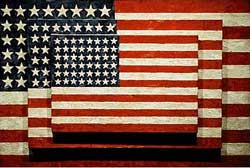 A new edition of the British magazine Granta is always cause for celebration. Founded in Cambridge in 1982 by American Bill Buford, Granta ploughs its own furrow, mixing fact, fiction, reportage and opinion in a seamless, usually thematic whole four times each year. Issue number 77, fresh from my post box, is even more thought-provoking than usual.
A new edition of the British magazine Granta is always cause for celebration. Founded in Cambridge in 1982 by American Bill Buford, Granta ploughs its own furrow, mixing fact, fiction, reportage and opinion in a seamless, usually thematic whole four times each year. Issue number 77, fresh from my post box, is even more thought-provoking than usual. The magazine has asked 24 writers, Lebanese, Serbian, Australian, Canadian and a native Hawaiian to ponder the role of America in their lives. It's a post-11 September exercise in reflecting on the most influential, powerful and wealthy nation that has ever existed. A rainbow of opinion and anecdote about matters American arcs from the beginning to the end of the book. Dubliner Fintan O'Toole gives the unique perspective of an Irishman raised in the austere 1960s, whose view of America is tinged with wealth, success and more than a little deception of the folks back home. Hanan al-Sheikh from Beirut relates the sad tale of a sister ejected from assisted housing for poor immigrants again and again.
British playwright and champagne socialist, Harold Pinter, rants about Washington as the capital of a rogue state that flouts international law and commits crimes around the globe. A Chinese professor of English, Lu Gusun, discovers the counterculture America in San Francisco in the 1980s when a light switch in his friend's flat is surrounded by a doctored photo of then President Reagan, the actual switch, predictably, is between the president's legs. Professor Lu-raised on reverence for authority and having met Reagan personally-is horrified and embarrassed for his hosts and the president.
A liberal Israeli, Haim Chertok, stoutly defends the role of the United States-where he was born-in keeping his new land afloat in a sea of hostility and violence. Chertok's voice is precious and rare these days, for he admits in print the mistakes made all around in his sad region, but asserts that America is fundamental to eventual peace in that cauldron of history and anger. A heartfelt contribution from Palestinian Raja Shahedah reveals that the city of Ramallah-now capital of Yasser Arafat's Palestinian Authority-has more native sons and daughters in America than remain behind. Shahedah compares the British and Israeli occupation of the West Bank by looking at the type of road each occupier built; the British, he says, built narrow, cheap, windy roads that followed contours and cupped ancient sites in their curves; the Israelis used American money to punch four-lane highways from their territory to Jewish settlements, security ever-present. Yet the writer-Palestinian and Ramallan to the core-says American goodness and optimism may yet tip the balance for peace in the Middle East. I wonder if Shahedah and Chertok have ever met to compare notes on the United States.
Perhaps the most interesting thought of all comes from Canadian Michael Ignatieff who writes of America as "the only country whose citizenship is an act of faith, the only country whose promises to itself continue to command the faith of people like me, who are not its citizens." Ignatieff begins his essay at an anti-Vietnam war rally in 1972, in the middle of one of the most turbulent periods in modern American history. It was a time when it seemed the colossus was on the ropes. The conflict in South-east Asia was going badly, hearts and minds at home were uncertain despite having re-elected Richard Nixon. Still to come were the carpet-bombing of Cambodia and the Watergate revelations of rot at the very heart of the White House, the uncertain Carter years, the Iranian hostage scandal and finally, Ronald Reagan.
What's most remarkable in America, for me and many of these writers, is that failure is usually little more than reinvention. Go bankrupt, get a court order, and start a new business next week. Get caught with your hand in the till, go to jail, pay your debt then renew your life's work. The foreign writers-all from societies where failure is more final-are in awe of this trait of American-ness. Some protest against it, most-rightfully see it as America's greatest achievement, the ability to transcend failure.
In these troubled times, it's clear that America is far more important to all of us, everywhere, than she ever was before. Her culture, economy and military might have doubled and trebled their influence in my lifetime and will do so again. This collection of essays could just be the start of a global exercise in accountability by those of us who are not America's citizens, but who live in its shadow and reflected light. The democracy that Washington has raised to high art demands accountability, checks and balances, not just within the superpower, but beyond its borders. Who knows? Perhaps one day they'll even give us the vote.



